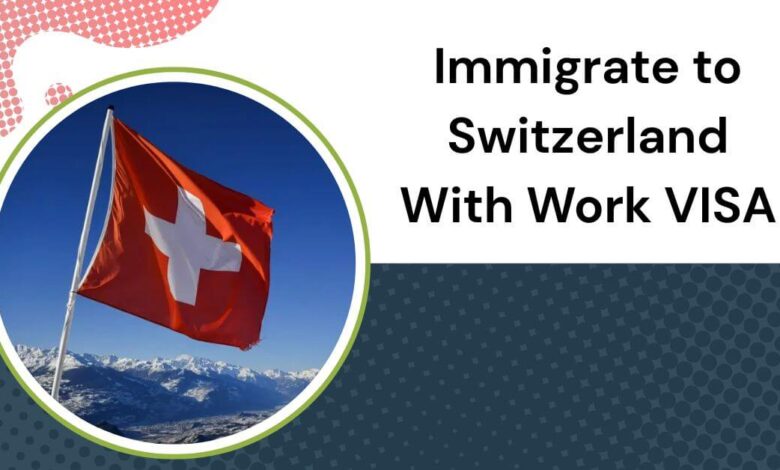Immigrate to Switzerland With Work VISA 2026

Switzerland has a robust economy, a stunning landscape, and a high standard of living. Starting the immigration process at an early stage is essential if you aspire to immigrate to this Alpine nation. Although may appear to be a distant future, the likelihood of a successful and seamless transition is significantly enhanced by meticulous preparation and meticulous planning.
This guide provides a comprehensive, step-by-step method for transforming your Swiss aspirations into true actuality.
Steps for Immigrate to Switzerland With Work VISA:
1# Define Goals to Check Eligibility for Swiss Immigration Programs
- Type of Stay: Determine whether your objective is a brief work assignment (a few months to a few years) or a more extended relocation. This has a substantial impact on the form of a Swiss work permit and your overall strategy.
- Skill Evaluation: Are your qualifications and experience in high demand in Switzerland? Consult the Swiss State Secretariat for Migration (SEM) website to identify industries with a high demand for migrant workers and skill shortage lists.
2# Secure a Job Offer: The Key to Success
Skilled labor is the primary focus of Switzerland’s immigration programs. Therefore, the most effective method for you to obtain a Swiss work permit is to secure a job offer from a Swiss employer. Begin the process now by following the steps outlined below:
- Begin by composing a Swiss-style CV and cover letter: Adjust your application materials to Swiss standards.
- Target Your Search: Concentrate on Swiss industries that are currently experiencing skill shortages and that align with your qualifications, as outlined below, under the expected salary range and the required qualifications.
List of In-demand Skill Shortage Professions in Switzerland (With Required Qualifications and Salary Expectations)
Some regions are experiencing shortages, particularly those that necessitate specialized skills. You may have a substantial advantage when contemplating immigration to Switzerland if your skills are in line with the following professions. The following is a list of in-demand disciplines, qualifications, and salary expectations:
| Professions | Qualifications Required for Switzerland Immigration | Expected Salary (CHF/month) |
|---|---|---|
| Heavy Vehicle Driver | Valid commercial driver’s license, experience, language skills | 4,500 – 6,500 |
| Machinery Operator | Specific vocational training/certification, relevant experience | 4,000 – 7,000 |
| IT/AI Professional | Degree in computer science/related, certifications, portfolio | 6,000 – 8,000+ |
| Nurse | Nursing diploma (Swiss Red Cross recognized), experience | 5,500 – 8,500 |
| Doctor | Medical degree, Swiss licensing, specialization | 8,000+ |
| Pharmacist | Degree in pharmacy, Swiss recognition procedures | 6,000 – 9,000+ |
| Electrician | Swiss Certificate of Competence (EFZ) or equivalent, experience | 5,000 – 7,500 |
| Plumber/Heating Tech | Swiss Certificate of Competence (EFZ) or equivalent, experience | 5,000 – 7,500 |
| Carpenter | Apprenticeship/vocational degree, project experience | 4,500 – 7,000 |
| Civil Engineer | Degree in Civil Engineering, (PE certification is a bonus) | 7,000 – 10,000+ |
| Mech./Elec. Engineer | Degree in relevant engineering, industry certifications | 7,000 – 10,000+ |
3# Find Jobs and Clear Language Requirements
Therefore, if you are seeking employment opportunities in Switzerland’s labor-shortage areas, there are numerous resources available to connect job applicants with vacancies in high-demand sectors:
Official Government and Cantonal Websites:
- State Secretariat for Migration (SEM): Includes an official skill scarcity list, as well as information on work permits and labor market conditions for non-EU/EFTA citizens.
- Cantonal Employment Portals: Each canton in Switzerland maintains its employment listings. For localized opportunities, conduct a Google search for the “[Canton Name] job portal.”
General Job Boards:
- jobs.ch: A prominent Swiss employment platform that enables you to refine your search to identify pertinent opportunities.
- Indeed Switzerland: This global employment board maintains an extensive presence in Switzerland.
Top Recruitment Agencies in Switzerland:
- Adecco: Provides a diverse selection of job opportunities, ranging from transient to permanent, in a variety of industries.
- Manpower: Well-known for its comprehensive coverage of a variety of employment profiles in Switzerland.
- Randstad: Offers a wide range of employment opportunities in various sectors and at all levels of expertise.
- Michael Page: Concentrates on the placement of mid- to high-level professionals and executive search across a variety of sectors.
- Robert Walters: Concentrates on executive and professional positions in various sectors.
- Hays: Provides specialized divisions for a variety of fields, including finance, engineering, life sciences, construction, and information technology.
- Tiger Recruitment: Concentrates on mid- to senior-level positions in a variety of sectors.
- Swisslinx: Recognized for its proficiency in finance, pharmaceuticals, information technology, and other fields.
These platforms and agencies offer a comprehensive starting point for individuals seeking to enter the Swiss job market, particularly in regions with a high demand for specialized labor.
Language Requirements for working in Switzerland:
Fluency in German, French, or Italian is not always explicitly required, but it significantly enhances your chances of success in the job market and facilitates your integration into Swiss society (Ref).
- Choose Your Focus: Concentrate on the language that is the most prevalent in the area where you aspire to reside.
- Learning Resources: Investigate language exchange programs, online courses, and language institutions.
- Language Tests: To formally demonstrate your proficiency, it is advisable to take the IELTS or another recognized language test.
4# Understanding the Swiss Immigration Process
In Switzerland, the majority of the work permit application procedure is typically overseen by your employer. Switzerland has implemented quotas for foreign laborers, with a particular emphasis on those from non-EU/EFTA countries. It is beneficial to submit your application as early as possible, as these quotas can fill up rapidly. Your likelihood of obtaining a permit can be enhanced by being proactive.
If you intend to relocate to Switzerland with your spouse or dependents, you must conduct concurrent research on their visa requirements and your own. This coordinated approach has the potential to simplify the process and decrease the probability of unforeseen delays (Ref).
5# Budget Realistically
Careful financial planning is essential for a seamless transition in Switzerland, which is renowned for its high cost of living.
- Essential Costs: It is crucial to consider a variety of initial expenses, such as visa fees, travel costs, initial housing deposits, health insurance, and fundamental living expenses. You must have a comprehensive comprehension of these expenses to effectively manage your finances during the transition.
- Contingency Fund: It is imperative to allocate additional funds for unforeseen expenditures. A financial reserve can be beneficial in reducing any unforeseen costs that may arise, as life in a new country can be unpredictable.
- Employer Benefits: Verify whether your employer provides relocation assistance, as it can significantly alleviate the financial burden of relocating. This may encompass contributions to temporary accommodation, visa application fees, or moving expenses.
This article concludes with a comprehensive examination of the expenses associated with the Swiss immigration process from A to Z. This breakdown can assist you in anticipating and preparing for the financial aspects of your transfer.
6# Practical Matters
- Accommodation: Conduct a thorough investigation of rental costs and housing options in advance. Temporary solutions should be taken into account for your initial arrival.
- Health Insurance: Swiss health insurance is mandatory. Research providers and comprehend the available coverage options.
- Culture Shock: To mitigate potential surprises, it is recommended that you acquire knowledge regarding Swiss customs, decorum, and cultural subtleties in advance.
Check Also: Jobs in Switzerland with Free Work Visa – Apply Now
How much will it cost to immigrate to Switzerland?
Depending on the specific circumstances of the individual, the total cost of immigrating to Switzerland may vary significantly. Here are the primary expenditures to take into account:
1# Visa and Permit Fees:
- Work Permit: The cost of a work permit varies by canton and permit classification, with a range of 100-500 Swiss Francs (CHF).
- Residence Permit: The cost of this permit is comparable to that of a work permit, and it is contingent upon the canton.
- Visas for Family Members: Dependent visas incur additional fees.
2# Pre-Move Expenses:
- Document Translation: The cost is contingent upon the quantity and nature of the documents.
- Qualifications Recognition: Fees for the evaluation and conversion of professional credentials.
- Language Examinations: The cost of the examination is contingent upon its nature.
- Health insurance is a necessity for the protection of any pre-existing conditions; the cost is contingent upon the provider.
3# Relocation Expenses:
- Transportation Belongings: The cost of transportation is contingent upon the volume and the shipping company.
- Flights: The cost of air travel is contingent upon the departure location and the time of year.
- Temporary Accommodation: Required during the search for permanent lodging.
4# Settling-In Expenses:
- Housing Deposit: Typically, the deposit is equivalent to three months’ rent.
- The initial month’s rent is contingent upon the size of the residence and its location.
- Furniture and Essentials: The initial expenses associated with establishing a residence.
- Health Insurance Requirement: Must be acquired within three months of arrival; premiums are contingent upon the provider and canton.
Benefits of Immigrate to Switzerland With Work VISA:
- High Standard of Living: Switzerland is distinguished by its exceptional infrastructure, public services, healthcare, and education, which are supported by a high standard of living.
- Competitive Salaries: Swiss employers generally provide competitive salaries, which are among the highest in the globe. This is indicative of the nation’s robust economy and elevated standard of living.
- Work-Life Balance: Swiss workplaces prioritize a healthy work-life balance, which is achieved through the regulation of working hours and the provision of generous vacation allowances. The country provides a plethora of recreational opportunities, including cultural events in cities and outdoor activities in the Alps.
- Healthcare Quality: Switzerland boasts one of the most exceptional healthcare systems in the world, offering top-tier medical services and facilities. Residents are deemed to have exceptional access to healthcare.
- Safe Environment: Switzerland is renowned for its secure living conditions and low crime rate, which make it an appealing destination for both families and individuals.
- Multicultural Society: The nation is culturally diverse, incorporating elements of German, French, Italian, and Roman Catholicism. This diversity fosters a diverse cultural environment and offers the chance to acquire proficiency in multiple languages.
Conclusion:
Immigrating to Switzerland with a work visa opens the door to excellent career opportunities, high living standards, and a secure future in one of Europe’s most prosperous countries. By meeting the eligibility requirements, securing a valid job offer, and following the official application process, skilled workers can build rewarding careers while enjoying Switzerland’s quality healthcare, education, and cultural diversity. A Swiss work visa not only ensures legal employment but also provides a pathway to long-term residency and personal growth in a thriving environment.
Frequently Asked Questions:
How long can you stay in Switzerland with a work visa?
Special short-term visas are not granted by Switzerland for seasonal, short-term, or summer laborers. On the other hand, you will be required to submit an application for a category D visa and secure an L permit that enables you to stay in the country for a maximum of one year.
Can I move to Switzerland for work?
Switzerland permits employment exclusively to qualified non-EU/EFTA nationals, such as managers, specialists, and university graduates with numerous years of professional experience. Even for temporary employment, a work permit is required for non-EU/EFTA nationals. The number of permits that can be issued is limited.
Is it easy to get a Switzerland work visa?
It is not always possible to obtain a work permit and reside in Switzerland if you are a national of a non-EU or EFTA country. Permits are given out solely for particular demographics.




